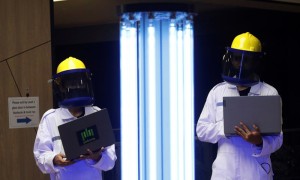MIT’s Computer Science and Artificial Intelligence Lab (CSAIL) has released a video of their ongoing work using input from muscle signals to control devices.
麻省理工学院的计算机科学和人工智能实验室发布了一个正在进行的项目的视频,利用肌肉信号输入控制设备。
Their latest involves full and fine control of drones, using just hand and arm gestures to navigate through a series of rings.
最新进展是对无人机进行全面精细控制,只用手和胳膊的动作就能控制它穿过一系列圆环。
This work is impressive not just because they’re using biofeedback to control the devices, instead of optical or other kinds of gesture recognition, but also because of how specific the controls can be, setting up a range of different potential applications for this kind of remote tech.
这个操作让人印象深刻,不仅是因为它利用生物反馈控制设备,代替了光学或其他类型的手势识别,还因为控制的精细程度,为这种远程技术创造了一系列潜在的应用方式。
This particular group of researchers has been looking at different applications for this tech, including its use in collaborative robotics for potential industrial applications.
这个特殊的研究小组一直在研究这项技术的不同应用,包括它在潜在工业应用的协作机器人中的使用。
Drone piloting is another area that could have big benefits in terms of real-world use, especially once you start to imagine entire flocks of these taking flight with a pilot provided a view of what they can see via VR.
无人驾驶是这项技术在现实中另一个用处很大的领域,你可以想象一下它们成群结队飞行的场景,一个飞行员可以利用虚拟现实通过无人机的视野去观察。
That could be a great way to do site surveying for construction, for example, or remote equipment inspection of offshore platforms and other infrastructure that’s hard for people to reach.
例如,这么好的方法可以用于测量施工现场,或者对海上平台和其他人们不容易到达的基础设施进行远程设备检查。
Seamless robotic/human interaction is the ultimate goal of the team working on this tech, because just like how we intuit our own movements and ability to manipulate our environment most effectively, they believe the process should be as smooth when controlling and working with robots.
实现机器人与人的无缝交互是这个团队研究这项技术的终极目标,因为就像我们能凭直觉知道自己的动作和最有效地控制环境的能力,他们认为控制和使用机器人时应该一样顺畅。
Thinking and doing are essentially happening in parallel when we interact with our environment, but when we act through the extension of machines or remote tools, there’s often something lost in translation that results in a steep learning curve and the requirement of lots of training.
我们与环境交互时,思维和动作应该是同时进行的,但我们通过机器或远程工具的扩展操作时,经常会出现偏差,导致学习速度慢,需要进行大量训练。







